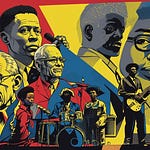Something remarkable happened in the reggae music landscape this year – but not in the way you might expect.
In what should have been a triumphant moment for the genre, with an unprecedented 75 GRAMMY submissions and a record-breaking influx of Caribbean voting members to the Recording Academy, we instead witnessed what might be the quietest voice for authentic reggae culture in recent memory.
This paradox begs a pressing question: Are we witnessing a shift in how the world perceives reggae music?
The numbers tell a sobering story. Within the Recording Academy's impressive membership of 11,000 voting members in 2023, the demographic landscape appears diverse at first glance.
Nearly half the members are people of color, with 27% being of Afro ethnicity, and an encouraging 46% under the age of 40. Yet these seemingly promising statistics mask a stark reality.
When we delve deeper into genre representation, the picture becomes clearer – and more concerning. Pop music dominates the landscape, commanding an overwhelming 41% of the membership's attention. R&B follows at 29%, with other genres like rock, rap, jazz, alternative, global music, Latin, and country dividing the remaining share.
And Reggae?
Our beloved genre claims less than 1.7% of the total representation.
This disparity leads us to an uncomfortable truth: the perception and evaluation of reggae music increasingly rests in the hands of those outside our culture.
The genre's identity in global spaces is being shaped not by those who live and breathe its authentic rhythms, but by those who encounter it through the lens of mainstream visibility, strategic social media content, and calculated publicity campaigns.
But here's where we need to pivot our thinking. We've been approaching this challenge from the wrong angle. The issue isn't simply about representation – it's about having representatives.
Though these words share the same root, they carry fundamentally different implications. While we've been focused on being represented, we've overlooked the crucial need for active representatives within the spaces where decisions are made.
The path forward requires a shift in strategy.
Rather than lamenting our lack of representation, we need to focus on positioning authentic voices within influential spaces.
This means Caribbean-based independent labels and distributors must step beyond their traditional roles. It's about more than just creating and distributing music – it's about actively participating in the bodies that shape how our music is perceived and recognized globally.
The solution lies not in complaining about problems we can't influence, but in becoming the influencers ourselves. We need more independent labels and distributors from the Caribbean to take decisive steps toward becoming representatives within these influential spaces.
The goal isn't simply to be seen – it's to be present where decisions are made, where narratives are shaped, and where the future of reggae music is determined. The time has come for a fundamental shift in our approach.
Until we have representatives in the right spaces to protect the genre's authentic representation in mainstream arenas like the Recording Academy, we'll continue to see our beloved music shaped by external perspectives.
The message is clear: it's not enough to seek representation – we must become representatives. As we move forward, let this be our rallying cry: The future of reggae music depends not on how well we're represented, but on how effectively we position ourselves as representatives of our culture, our music, and our heritage.
This is not just about being in the room – it's about having a seat at the table.
Lloyd 'Reggaeology' Laing
Music Business Analyst and Advocate for Fair Pay. Follow @Reggaeology Everywhere













Share this post